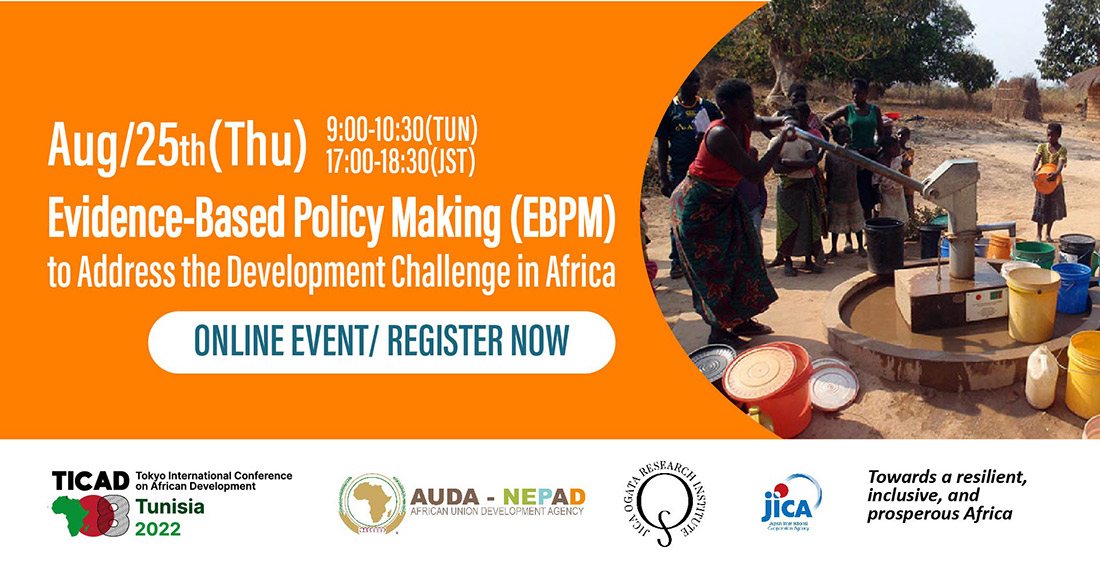Evidence-Based Policy Making (EBPM)to Address the Development Challenge in Africa
- Date
- 2022/8/25 (Thu)17:00-18:30(JST)
- Field
- Policy Making
- Type of Event
- Online Webinar
- Co-Host
- African Union Development Agency-NEPAD (AUDA-NEPAD)
Background
Evidence-based policy making (EBPM) is becoming increasingly important in the formulation of development policies and the planning of development projects. Specifically, it is important to quantitatively evaluate the effects of past policies and projects using statistically rigorous methods because the results will be used as evidence for future development policies and projects. In Africa, the results of empirical analysis using econometrics and other methods have been accumulated on issues such as health, education, and infrastructure.Additionally, Africa faces a major turning point with COVID-19, digitalization, and climate change. In such situations, it is expected that evidence will play an even greater role in future policy making and project planning.
JICA has been providing evidence that can contribute to solving development issues in African countries. Policies and projects that JICA has verified and documented as effective include market approaches to agricultural development, village sanitation, local roads, and trust building through sports in the region. These can yield lessons for planning future development policies and projects in African countries.
AUDA-NEPAD is equipped with available program evaluation information to support policy decisions and can leverage its knowledge capacity to better inform future decisions. Based on Africa's contemporary issues,AUDA-NEPAD conducted research in partnership with Denver University and jointly produced the Pardee Study, which highlights four areas of transitions that speak to Africa's choices regarding these issues in support of Member States' development pathways and economic growth.
On the other hand, the introduction and expansion of EBPM in actual policy planning and implementation are not always smooth. This is due to issues such as additional costs and conflicts associated with the decision-making process and the speed at which policy makers work.We will also discuss how EBPM can be implemented in African development practice, in collaboration with AUDA-NEPAD, to overcome these challenges.
Key Questions
- What are the recent findings of empirical research on development in Africa?
- How should evidence from such research be applied to future development policy making and project planning in the African region?
- What are the needs and directions of African empirical research that should be addressed in the future?
Objective
This event will disseminate the latest evidence being generated by the JICA Ogata Research Institute, AUDA-NEPAD, and researchers affiliated with local research institutions to policy makers, practitioners, and researchers in African countries . We will discuss the applicability of the evidence to future development policy making and project planning, as well as the needs and directions of African empirical research that should be addressed in the future.
Speakers
- Mr. Koji Makino
- Director General, JICA Ogata Research Institute
- Dr. Satoshi Shimizutani
- Executive Senior Research Fellow, JICA Ogata Research Institute
- Dr. Zerihun Berhane
- Associate Professor, Head of the Center for African and Asian Studies, Addis Ababa University
- Prof. Daniel Mukoko
- Professor, Faculte des Sciences Economiques, Universite de Kinshasa, and former Deputy Prime Minister of Democratic Republic of Congo
- Ms. Alize le Roux
- Senior Researcher, Institute for Security Studies
- Ms. Pamla Gopaul
- Senior Program Officer and Lead Coordinator of Policy Bridge Tank, AUDA-NEPAD

*The deadline for registration is 17:00, Wednesday, August 24 (Japan time).


